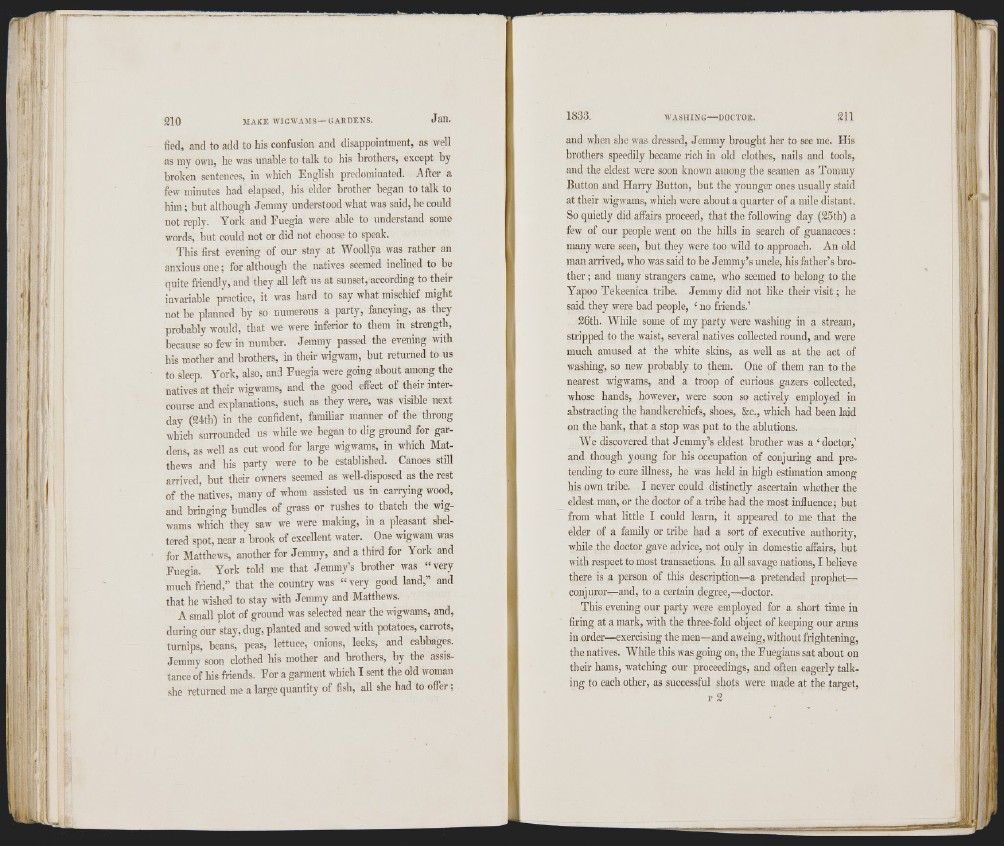
210 MAKE WIGWAJIS— GARDENS,
j
.»■
■Á
fied, and to add to his confusion and disappointment, as well
as my own, he w'as unable to talk to his brothers, except hy
broken sentences, in which English predominated. After a
few minutes had elapsed, his elder brother began to talk to
hivn; hut although Jemmy understood what was said, he could
not reply. York and Fuegia were able to understand some
words, but could not or did not choose to speak.
This first evening of our stay at Woollya was rather an
anxious one; for although the natives seemed inclined to he
quite friendly, aud they all left us at sunset, according to their
invariable practice, it was hard to say what mischief might
not be planned by so numerous a party, fancying, as they
probably would, that we were inferior to them in strengdi,
because'so few in number. Jemmy passed the evening with
his mother and brothers, in their wigwam, but returned to us
to sleep. York, also, and Fuegia were going about among the
natives at their wigwams, and the good effect of their intercourse
and explanations, such as they were, was visible next
day (24th) in the confident, familiar manner of the throng
which surrounded us while we began to dig ground for gardens,
as well as cut wood for large wigwams, in which Matthews
and his party were to be established. Canoes still
arrived, but their owners seemed as well-disposed as the rest
of the mtives, many of whom assisted us in carrying wood,
and bringing bundles of grass or rushes to thatch the wigwams
which they saw we were making, in a pleasant sheltered
spot, near a brook of excellent water. One wigwam was
for Matthews, another for Jemmy, and a third for York and
Fuegia. York told me that Jemmy’s brother was “ very
much friend,” that the country was “ very good land,” and
that he wished to stay with Jemmy and Matthews.
A small plot of ground was selected near the wigwams, and,
during our stay, dug, planted and sowed with potatoes, carrots,
turnips, beans, peas, lettuce, onions, leeks, and cabbages.
Jemmy soon clothed his mother and brothers, hy the assistance
of his friends. For a garment which I sent the old woman
she returned me a large quantity of fish, all she had to offer ;
and when she was dressed, Jemmy brought her to see me. His
brothers speedily became rich in old clothes, nails and tools,
and the eldest were soon known among the seamen as Tommy
Button and Harry Button, but the younger ones usually staid
at their wigwams, which were about a quarter of a mile distant.
So quietly did affairs proceed, that the following day (25th) a
few of our people went on the hills in search of guanacoes :
many were seen, but they were too wild to approach. An old
man arrived, who was said to be Jemmy’s uncle, his father’s brother
; and many strangers came, who seemed to belong to the
Yapoo Tekeenica tribe. Jemmy did not like their visit; he
said they were bad people, ‘ no friends.’
26th. While some of my party were washing in a stream,
stripped to the waist, several natives collected round, and were
much amused at the white skins, as well as at the act of
washing, so new probably to them. One of them ran to the
nearest wigwams, and a troop of curious gazers collected,
whose hands, however, were soon so actively employed in
abstracting the handkerchiefs, shoes, &c., which had been laid
on the bank, that a stop was put to the ablutions.
We discovered that Jemmy’s eldest brother was a ‘ doctor,’
and though young for his occupation of conjuring and pretending
to cure illness, he was held in high estimation among
his own tribe. I never could distinctly ascertain whether the
eldest man, or the doctor of a tribe had the most influence; but
from what little I could learn, it appeared to me that the
elder of a family or tribe had a sort of executive authority,
while the doctor gave advice, not only in domestic affairs, but
with respect to most transactions. In all savage nations, I believe
there is a person of this description—a pretended prophet—
conjuror—and, to a certain degree,—doctor.
This evening our party were employed for a short time in
firing at a mark, with the three-fold object of keeping our arms
in order—exercising the men-—and aweing, without frightening,
the natives. While this was going on, the Fuegians sat ahout on
their hams, watching our proceedings, and often eagerly talking
to each other, as successful shots were made at the target,
p 2 ■il